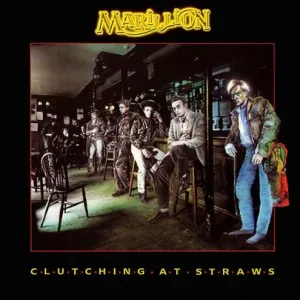Story behind the record sleeve: Clutching at Straws [1987] – Marillion – Poppodium Boerderij

Story behind the record sleeve: Clutching at Straws [1987] – Marillion
TUE 5 APR ’22
The price of fame. Dutch comedians Freek de Jonge and Bram Vermeulen (a.k.a. Neerlands Hoop) wrote a beautiful song about it back in 1977. If you are successful, you will be lived and you will not be able to enjoy your money. That’s the price of fame.
Marillion vocalist Fish knows this all too well. Due to the success of the album “Misplaced Childhood” in particular, the pressure on the band to continue with the success formula was enormous. A grueling world tour followed. Fish’s life consisted mainly of hotel rooms and bars. To the outside world he played the jester and the celebrated pop star, but in the evening he was struck with fear and self-doubt. Booze and drugs destroyed his life. He didn’t really want to continue with this life. He realized it would be his downfall. The price of fame. He clung to a straw: one more album with Marillion, which would be aptly called “Clutching at Straws”. He then left the band, despite its success.
“Clutching at Straws” became a concept album about a writer, Torch, with so-called writer’s block. He can’t get a word out of his pen after the success of his latest novel. He looks back on his life and realizes that he’s made a mess of it. Each song portrays a moment in Torch’s life and his demise into alcohol and drug abuse to escape his responsibilities and his shortcomings as a person. “Clutching at Straws” represents the desperation of Torch, Fish’s alter ego, unsurprisingly.
Fish also wanted to get rid of Marillion’s trademark clown (‘Jester’). On the three previous albums, Jester is prominently present on the cover. Fish makes the jester disappear through the window on the back of the “Misplaced Childhood” cover.
For the cover of “Clutching at Straws”, illustrator Mark Wilkinson initially conceived a fallen angel, Valkyrie, as main character. The idea appealed to Fish, but the cover should also have something to do with a bar, because the life of protagonist Torch mainly took place there. A pool table was also a requirement because the song Warm Wet Circles refers to it. It became a difficult process for both Wilkinson and Fish to arrive at a final result.
All the time there was considerable pressure on the production of the album cover. The album had to be released simultaneously in America and Europe, but the American market in particular had high demands. For example, there was no gate-fold cover. Wilkinson only had ten days instead of several months to come up with the cover. He therefore chose a picture of a pub in his hometown of Colchester. Cozy, but rather small. A suitable spot for the pool table was found: on the back cover. The band members sit and stand around it, with John Lennon, movie star James Dean and writer Jack Kerouac, sources of inspiration for Fish, sandwiched in between.
On the front we see main character Torch. He’s taken off his jester suit, but it’s still dangling from his belt. Some of his heroes are located next to him at the bar. Comedian Lenny Bruce, writer Truman Capote, English poet Dylan Thomas and Scottish poet Robert Burns. Four men with one common denominator: a heavy drink and/or drug addiction that ultimately cost them their lives. It is no coincidence that that is the predominant theme of “Clutching At Straws”.
It was an immense job for Wilkinson to get the collage as realistic as possible. Photoshop didn’t exist in 1987. He succeeded just in time. Although less commercially successful than predecessor “Misplaced Childhood”, “Clutching at Straws” is often regarded as Marillion’s best work. Darker than other albums, but successful because of its concept and its catchy melodies and lyrics.
It didn’t change Fish’s mind. His decision was made, he was determined to leave Marillion. No more theater, no more playing the clown, or rather the jester. He informs his fans of this sad news on the back of the cover of “Clutching at Straws” via a quote from ‘Lof der Zotheid’ (In Praise of Folly) from 1509, by famous Dutch humanist Erasmus. In short, life is a play in which people wearing masks play their part until the director takes them off the stage.
Fish didn’t want to wait for that; he continued his career with a number of solo albums on which he could go his own way.
Guitarist Steve Rothery continued on with Marillion and still performs live, also as solo artist. On April 15, he will be back at Poppodium Boerderij.
Gerrit-Jan Vrielink
Thanks to Frans Schmidt and Progwereld






